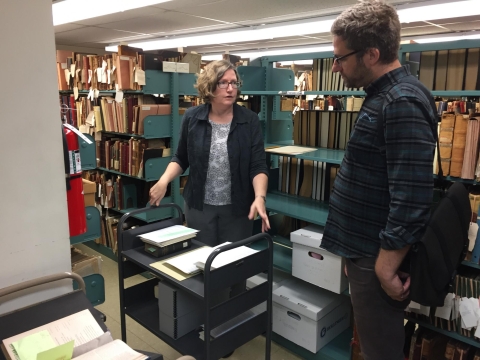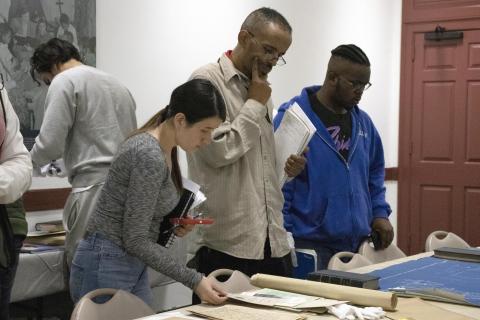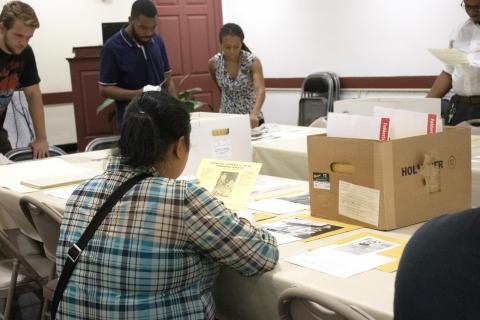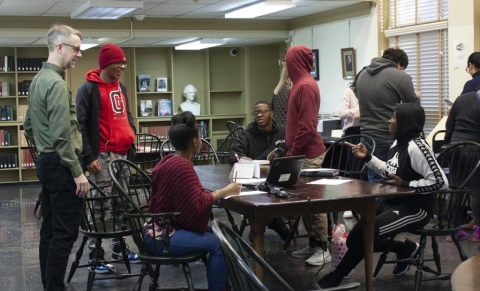Building Knowledge and Breaking Barriers grew out of the belief that the Presbyterian Historical Society could create meaningful firsthand encounters between Community College of Philadelphia students and historically resonant documents, build research and critical-thinking skills important to student success in academic and vocational pursuits, and identify ways to assist Philadelphia students and educators more in the future. Confronting barriers to student access and inclusion at PHS was also a main project goal.
Learn about the project's Beginnings, Groups and Leaders, Goals and Progress, and Hopes for the Future.

Beginnings
Following an educational programming consultation with Deborah Schwartz in Spring 2017, during which PHS staff discussed learning opportunities available through the PHS collections, the society identified CCP as an ideal institution to partner with. The college’s large student body is as diverse as Philadelphia, and few of its students had experience researching at area archives. Prior to 2017, PHS (the national archives of the Presbyterian Church U.S.A.) had hosted only a handful of visiting classes, most from local Presbyterian church groups or seminaries.
PHS could welcome college-age students without making the kind of staffing changes visiting elementary or middle school classes would require. Also, PHS’s primary source materials and research tools seemed a better fit for mature student groups than younger audiences.

Without the leadership of professors from CCP’s Liberal Arts program, the collaboration would not have grown into what became the BKBB project. In spring 2017, CCP Professor Brian Seymour connected PHS with Professor Joel Tannenbaum, who began working closely with PHS to curate the first 70 primary and secondary sources, arranged in 6 source sets, that the society would make available to CCP students. In fall 2017, Joel brought the first CCP class, 19th century US History, into the archive for an orientation visit that was followed later in the semester by follow-on research visits by individual students. Encouraged by that semester’s work and the following semester when Professor Jackie Akins brought her African American History class into the archive, the society applied for project grant support from The Pew Center for Arts & Heritage. Work on what became known as Building Knowledge and Breaking Barriers began in July 2018.
Learn about the BKBB source sets and the institutions that made the project possible
Groups and Leaders
During the project’s first year, Joel, Brian, and Jackie introduced PHS to the other CCP Professors who would bring classes to PHS during the project’s five semesters, including David Prejsnar (Religious History) and Anyabwile Aaron Love (African American History); Miles Grosbard (Architectural History of Philadelphia); Simone Zelitch (Creative Writing); and Cindy Giddle (Research Writing). Students and educators from CCP’s Parkway Program (led by Osvil Acosta-Morales or David) and Honors Program (led by Brian) visited PHS for one-off encounters with archival materials curated specifically for each trip. Simone’s first project with PHS was another one-off collaboration, and a remote one. Her creative writing students wrote poetry based on digitized photos from the PHS missionary collection.
Most students participated in the project through semester-long class engagements with the archive, including an orientation visit to the society and follow-up visits where students used primary and secondary source materials in group or individual projects, including research papers, group projects on history or architecture, and fiction writing.
Our team of Project Experts oversaw the initial and mid-term project planning, including identifying CCP classes that would be well-suited to work with PHS materials, developing job descriptions for two major project contract positions (History Resource Writer and Writing Tutor), addressing early access and inclusion concerns, and adding students to the exhibit team. Project experts distinguished themselves for inclusion in BKBB because of their track records working with PHS staff, PHS collection materials, and CCP students (Jackie Akins and Joel Tannenbaum); increasing diversity and representation at schools and nonprofits (Marian Vasser); teaching primary sources to history students (Abby Reisman); and creating innovative educational programming (Deborah Schwartz). Exhibit professionals Stacey Mann and Keith Ragone also joined the Expert Panel discussions, along with PHS staff members Jenny Barr, Lorraine Brown, Kristen Gaydos, Beth Hessel, Sonia Prescott, Nancy Taylor, and Fred Tangeman. Attending the summer 2019 meeting were by-then contracted project staff members Hannah Carney (History Resource Writer), Jamail Khan (Writing Tutor), and Carmella Vassor-Johnson (Project Videographer).

Over the next two-and-a-half years, the project experts, PHS staff, and CCP collaborators worked together to develop teaching materials, curated sources, and other project assets that built knowledge along the 300 students who worked in the archive or with PHS collection materials online. Driving all project work was the goal of making PHS more accessible, welcoming, and helpful to Philadelphia students. The Student Exhibit Team and Project Interns, composed of select students who first visited PHS with their classes, were especially important to this effort.
The eight-person exhibit team spent more than a year constructing art and history installations that tell the story of BKBB from the student perspectives--what interested them most about working up-close with historical materials and spaces, and what they saw as future opportunities for increased student involvement with PHS and other area cultural institutions. Like BKBB’s three project interns (spring 2019, summer 2019, and spring 2020), the student exhibitors worked with archival materials and society staff inside the PHS building and remotely during the pandemic, learning an array of skills they can apply to future work with archives (processing, description, preservation) or other cultural institutions (exhibit preparation, video and blog storytelling, marketing).

Goals, Progress, and Modifications
Building Knowledge and Breaking Barriers’ two main goals are included in the project name. From the project’s beginning, those goals included the following steps:
- Building Knowledge: Through semester-long collaborations between PHS and 6 to 8 CCP classes during 4 major (fall and spring) academic semesters, produce theme- and subject-centered curriculum aids (many gathered here as source sets), student-led research projects, a student-led exhibit; and end-of-semester events celebrating student accomplishment and development as researchers; and
- Breaking Barriers: Through classroom visits to the PHS building, a student-led exhibit, internships, and other project engagements, identify ways the society can be a more welcoming and supportive institution for CCP, other Philadelphia students, and student support networks.
Although we successfully carried out all programming mentioned above, and in the process identified the most persistent barriers to access at the society, the Covid-19 pandemic curtailed project collaborations in shared spaces beginning in March 2019. At that time much of the project work moved online, including student exhibit development meetings, internship work, and orientation sessions for classes about primary sources and the PHS archive. Project work that could not take place remotely, such as classroom visits to the archives and follow-up research visits by students, have been rescheduled for spring or fall 2021, depending on when PHS and CCP allow for in-person group activities again. Until then, information on BKBBphilly.org will be especially important to educators, students, and archivists looking to learn about the project or access its resources.
During the four academic semesters we planned for at the start of the project, more than 200 students from six subject areas visited PHS multiple times as part of semester-long classroom engagements, with an additional 90 students visiting PHS for single class-based trips. Additional members of the CCP community--student families and supporters, educators, and staff--learned about BKBB during PHS staff visits to classes at the college’s Spring Garden campus. Other members of the CCP and PHS communities learned about BKBB during three end-of-semester events--two at PHS and one at a restaurant near CCP. The exhibit launch, planned for March 2021, will be celebrated online, with visitors able to view the socially distanced installations at the PHS building from spring 2021 into 2022 and indefinitely online via the project website.
Considerable time, resources, and energies went into developing the teaching materials that help students understand the historical context of the primary sources they explore during their subject-related research, an effort led by History Resource Writer Hannah Carney. Those materials and associated primary and secondary sources are available in the building or online as part of the project’s 15 source sets; with more source sets planned for the future. In addition to the PHS project leaders listed on our People page, PHS staff members provided significant support to BKBB students and educators, including the digitization team that scanned primary sources for inclusion on the website, archivists who helped student exhibitors explore the international and social justice-related collections students were especially interested in, and the reference team that worked with students conducting research in the PHS reading room.
Future Collaborations
Building Knowledge and Breaking Barriers is just one example of educational collaboration taking place between institutions around the nation. We hope others draw lessons and inspiration from BKBB in much the way we did from earlier initiatives, including TeachingArchives.org and Stanford’s History Education Group. The smaller size and scale of BKBB relative to those programs is proof that much can still be achieved wherever there is a willingness to collaborate among educators, students, and archives, and when community resources can facilitate opportunities for historical discovery, as well as educational and professional growth.
This last point is especially important. Without the financial support of The Pew Center for Arts & Heritage, many of the project’s measures on behalf of students would have been difficult to implement, including travel reimbursements for student visits to PHS, writing-tutor assistance, internship funding, and honorariums for student exhibitors and educators. Financial support to contracted project staff allowed us to develop versatile teaching materials and help students tap into the myriad resources at PHS in order to craft research projects and create art.
Educators and students benefit when the material culture of a community is brought into the classroom--in the case of BKBB, primary sources, archival know-how, and storytelling expertise. But archives gain at least as much from such programming as schools do. Throughout Building Knowledge and Breaking Barriers, the Presbyterian Historical Society developed a deep appreciation for the talents of Community College of Philadelphia students and educators, and a greater awareness of the forces inside and outside PHS that prevent them from exploring archival collections or accessing learning resources elsewhere in Philadelphia.
Please contact us if you have questions about BKBB, or if we can help you prepare for your own collaboration. And if your institution has already hosted or participated in an archives-based learning project, please let us know how we might build on this work. In the months and years ahead, we look forward to showing you more about the continuing partnership between PHS and CCP, and seeing not just new students taking their first tentative steps into an archive, but the looks of excitement and growing confidence that accompany their return visits.
